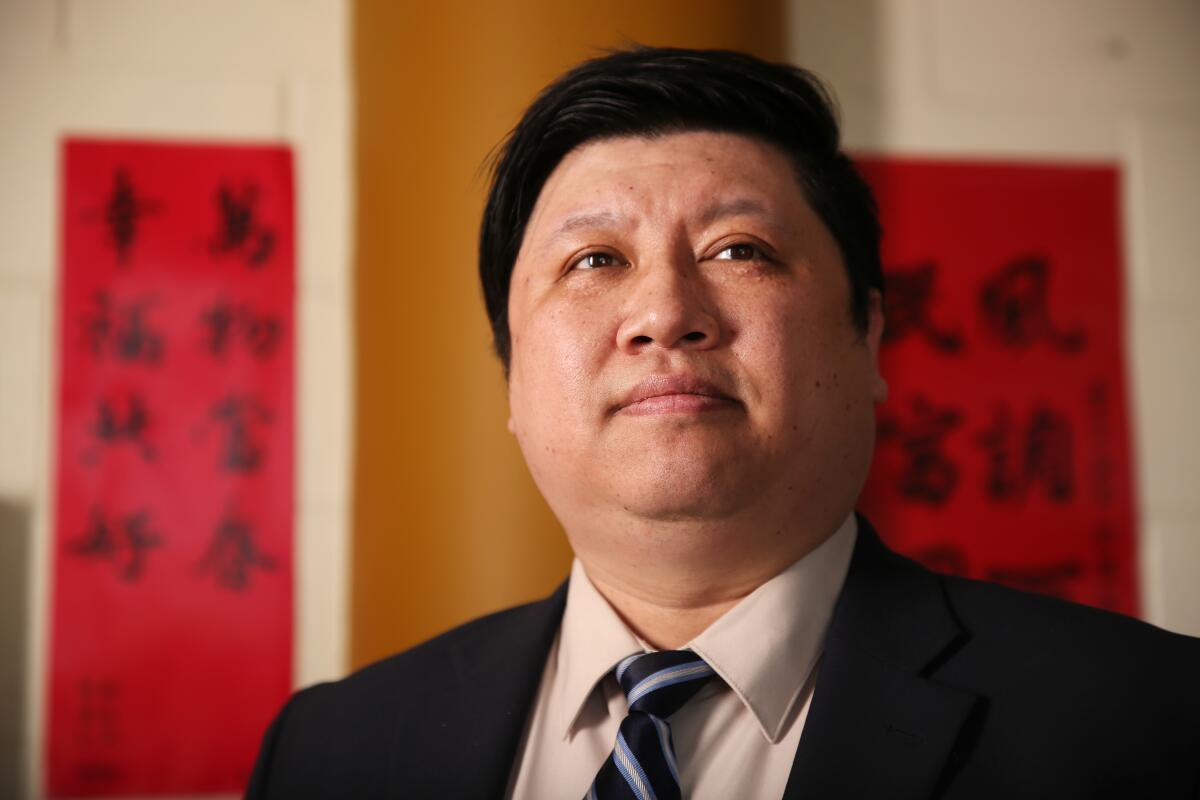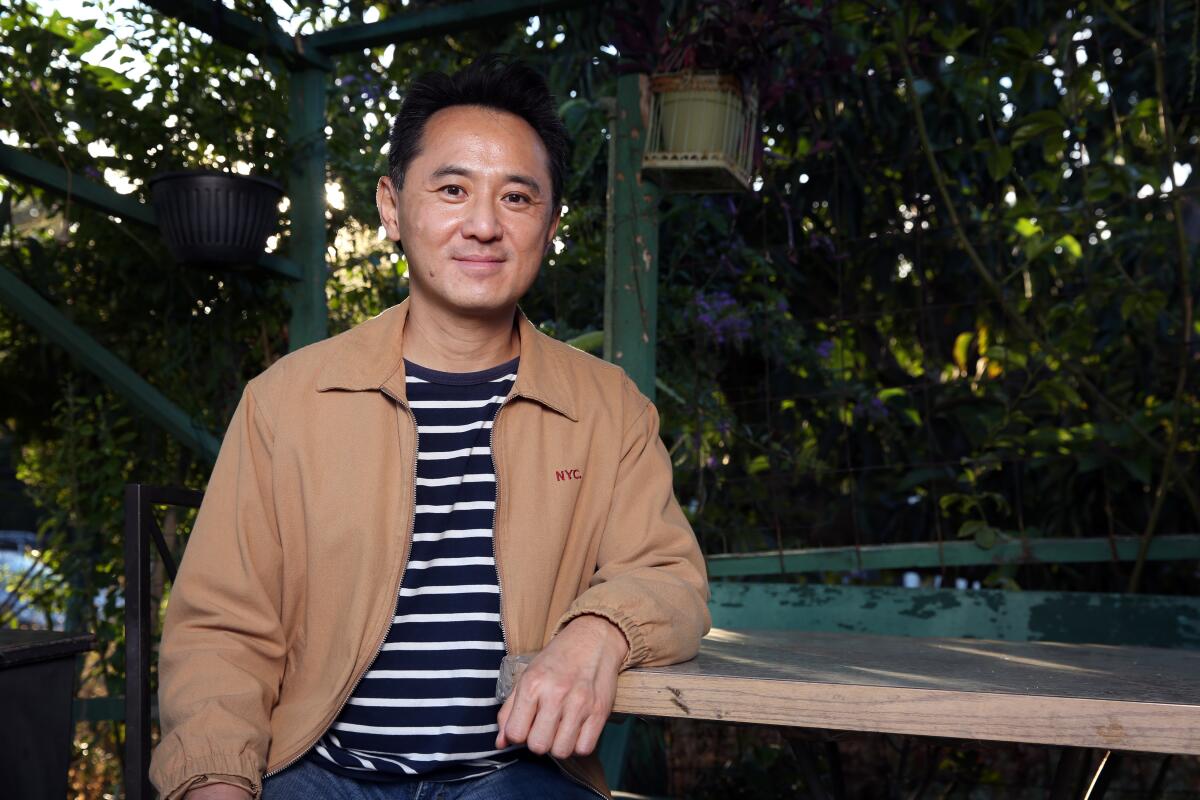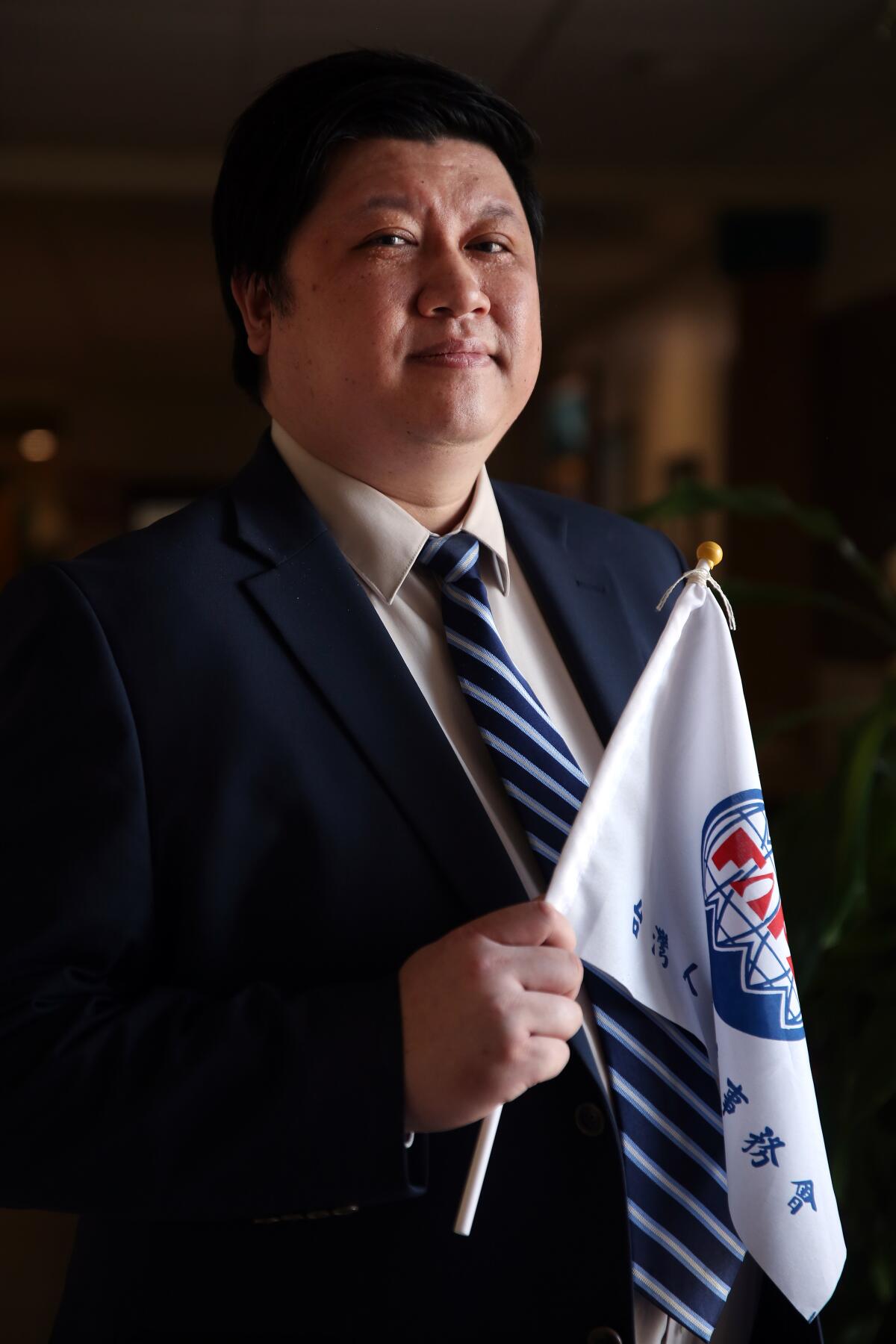Some Taiwanese immigrants fear Biden will ‘Make China Great Again.’ Can he win them over?

For Jack Tseng, supporting Donald Trump isn’t just about MAGA.
It’s about MCGA — “Make China Great Again,” a slogan Tseng invented for what he fears Joe Biden will do as president.
For the record:
1:48 p.m. Dec. 7, 2020This article incorrectly paraphrases American Enterprise Institute fellow Michael Mazza as saying that the Trump administration respects the one China policy. In fact, Mazza said the current administration’s approach to China was consistent with precedent and the one China policy.
12:08 p.m. Dec. 4, 2020This article incorrectly paraphrases American Enterprise Institute fellow Michael Mazza as saying that nuts-and-bolts diplomacy is done behind the scenes by senior staffers whose approach doesn’t usually vary much between administrations. The only statement Mazza made about senior staffers concerned their role in Taiwan policy during Trump’s presidency.
Despite living in the U.S. for 40 years, Tseng cast his vote in the presidential election largely based on Taiwan, the island where he grew up, which exists in a precarious limbo under threat of being taken over by China.
Before the election, Tseng, a retired aerospace engineer from Arcadia, handed out shirts and hats emblazoned with “MAGA or MCGA” to anyone who would take them.
He likes Trump’s tough rhetoric on China and pro-Taiwan moves, from taking President Tsai Ing-wen’s congratulatory phone call — unprecedented for an American president-elect — to dispatching high-level officials to the island democracy. He worries that Biden will not defend Taiwan if China attacks. Like many Trump supporters, he has not yet accepted that Biden won.
“If Biden is president, the U.S. will become a socialist state controlled by China,” said Tseng, 67, head of the Formosa Republican Assn., which promotes conservative and Christian values. “Trump will hold his ground in the trade war, but Biden won’t.”
Among Southern Californians with roots in Taiwan, there is a strong vein of support for Trump. Some are single-issue voters who value their homeland’s interests above domestic issues.
Other Taiwanese Americans back Biden because of his more measured approach on foreign affairs, his domestic policies or the expectation that he will condemn China’s human rights violations against Muslim Uighurs in the far western Xinjiang region.
What they all have in common is a deep concern for their native island, which transitioned from martial law to democracy and is de facto independent, with its own government and military, but is not officially recognized by most countries.
China regards Taiwan as a renegade province and vociferously objects to any attempts to place it on an equal footing. Taiwan cannot join the World Health Organization, even after mounting one of the world’s most successful responses against the coronavirus.
With fighter jet sorties into Taiwanese airspace and strident remarks against any friendly gesture toward Taiwan, China has recently grown more aggressive.
It is unclear whether Biden’s approach to Taiwan will be substantively different from Trump’s, though he is likely to adopt a more low-key diplomatic style with fewer showy gestures that would upset China.

Barney Cheng, whose parents are from Taiwan, voted for Biden because he anticipates that the former vice president will be better at international conflict resolution. Trump puts his own personal interests first, Cheng said.
Cheng also criticized Trump for not protecting marginalized communities, including LGBTQ people. Cheng said he does not believe Trump has done enough to stand up against the Chinese government’s imprisonment of Uighurs in Xinjiang.
“I understand where Taiwan is coming from because they’re so threatened every day from China,” said the filmmaker, 49, who lives in West Hollywood. “It’s become a single issue for Taiwanese Americans because their family and homeland is under constant threat.”
Michael Mazza, a fellow at the American Enterprise Institute, is among the foreign policy experts who predict that Biden will not drastically change course from Trump on Taiwan.
Most nuts-and-bolts diplomacy is done behind the scenes by senior staffers whose approach doesn’t usually vary much between administrations, Mazza said.
Despite Trump’s attempts to shake things up, his administration ultimately stayed in line with important precedents, including respect for China’s bottom line — that there is only one China, which includes Taiwan province, Mazza said.
However, in mid-November, Secretary of State Michael R. Pompeo said that “Taiwan has not been part of China,” prompting an angry response from a Chinese Foreign Ministry spokesman.
In the last four years, the Trump administration has stepped up arms sales to Taiwan and increased diplomatic engagement, including sending Health and Human Services Secretary Alex Azar to the island in August to discuss COVID-19 — the highest-level visit since the U.S. cut formal diplomatic ties in favor of China in 1979.
“There’s no reason why we can’t continue on the course we’ve been on in a Biden administration and continue to pursue incremental improvements with Taiwan,” Mazza said.
Last week, Biden announced that Antony Blinken, a senior State Department official in the Obama administration, was his pick for secretary of State.
A Biden transition official said the president-elect is committed to both the Taiwan Relations Act, which emphasizes that the future of Taiwan should be settled by peaceful means, and to the one China policy.
“Once in office, he will continue to support a peaceful resolution of cross-strait issues consistent with the wishes and best interests of the people of Taiwan,” the official, who declined to be identified, said in a written statement. “He has long said that American support for Taiwan must remain strong, principled, and bipartisan, and he plans to work to ensure that.”
As a former vice president, Biden is probably familiar with standard protocols governing Taiwan relations, which would preclude a phone call such as the 10-minute conversation Trump had with Tsai on Dec. 2, 2016.
China regularly issues harsh statements condemning Tsai, whose Democratic Progressive Party stops short of declaring Taiwanese independence but will not agree to China’s preconditions for diplomatic talks.
When Tsai won reelection in January, Biden tweeted congratulations:
“You are stronger because of your free and open society. The United States should continue strengthening our ties with Taiwan and other like-minded democracies,” he wrote.
Tsai returned the favor after Biden’s victory, attaching his earlier tweet and writing, “The values on which we have built our relationship could not be stronger. I look fwd to working together to further our friendship, & contributions to int’l society.”
Such diplomatic niceties are not enough to reassure some Taiwanese Americans.
Vera Yang, a Trump supporter from Pasadena who was born in Taiwan, fears that Biden will focus on domestic issues at the expense of international relations, potentially putting Taiwan in a weak position if China attacks.
“China doesn’t play by the rules. Trump gets that. He gave them a difficult time,” said Yang, 44, an office manager. “I’m not sure how Biden will deal with that.”

Ken Wu, who came to the U.S. as a child in 1991, voted for Trump because of the president’s unorthodox actions in support of Taiwan.
Wu is anxious about China’s recent incursions into Taiwanese airspace. He says his extended family in Taiwan would feel safer with Trump as president.
“Biden won’t escalate the issue to where both countries are at the brink of war, but we need more assurance that we’ll see more U.S.-Taiwan relations,” said Wu, 40, of South Pasadena, who is president of the independence-leaning Formosan Assn. for Public Affairs’ Los Angeles chapter.
Wu noted that there is a contradiction in Taiwanese people supporting Trump, whose rhetoric domestically has been divisive and sometimes racist, when they themselves suffered under martial law for decades.
John Wu, 46, a real estate broker from San Gabriel, also voted for Trump — because of the president’s economic and domestic policies, not Taiwan.
As a dual citizen, Wu is active in Taiwan’s Kuomintang party, which favors closer ties with China. He thinks Biden will cool the growing cross-straits tensions and will probably try to repair relations with China.
Like Ken Wu, Fred Chang of Rosemead supports Taiwan’s Democratic Progressive Party and approves of Trump’s tough-on-China approach.
But as a registered Democrat and political moderate, he voted for Biden, alienated by Trump’s response to the COVID-19 pandemic and his extreme statements over the last few months.
Chang, 41, an accountant who came to the U.S. at age 13, expects Biden to stay the course on Taiwan.
“I’m hopeful that Biden will maintain these relationships,” he said. “I don’t think he’s going to go back on what Trump has done, and he’ll be methodical about his policy.”
More to Read
Sign up for Essential California
The most important California stories and recommendations in your inbox every morning.
You may occasionally receive promotional content from the Los Angeles Times.











